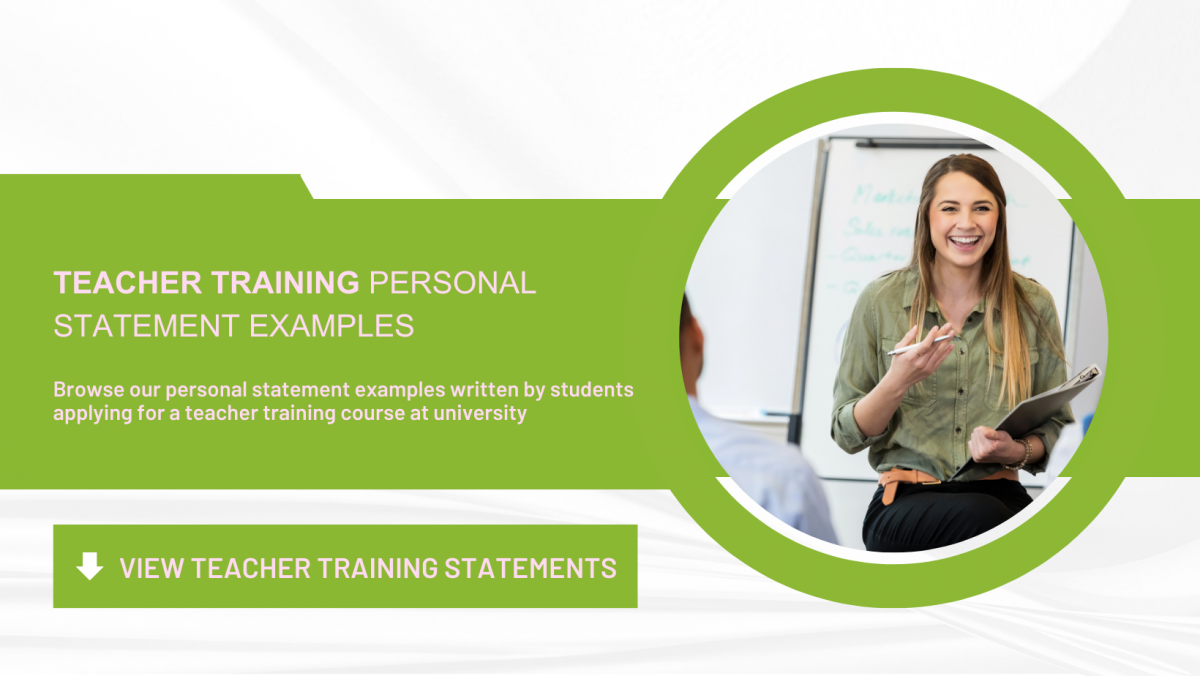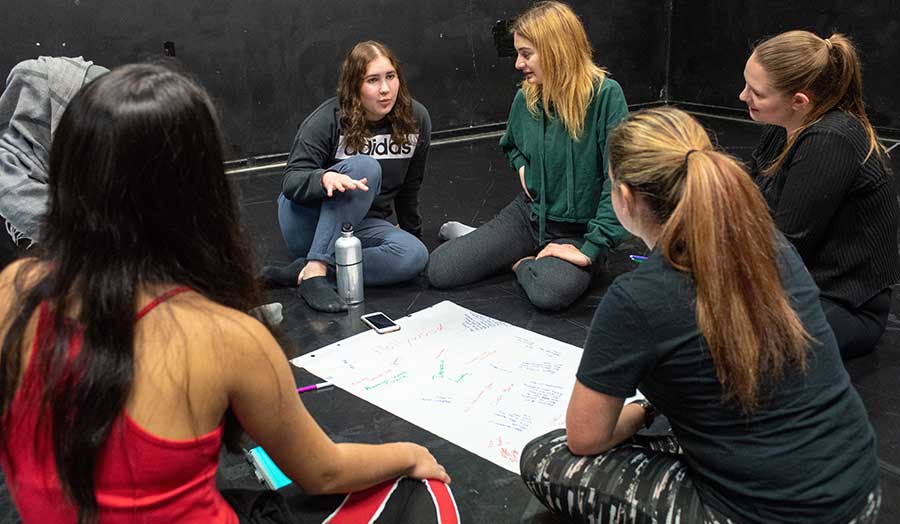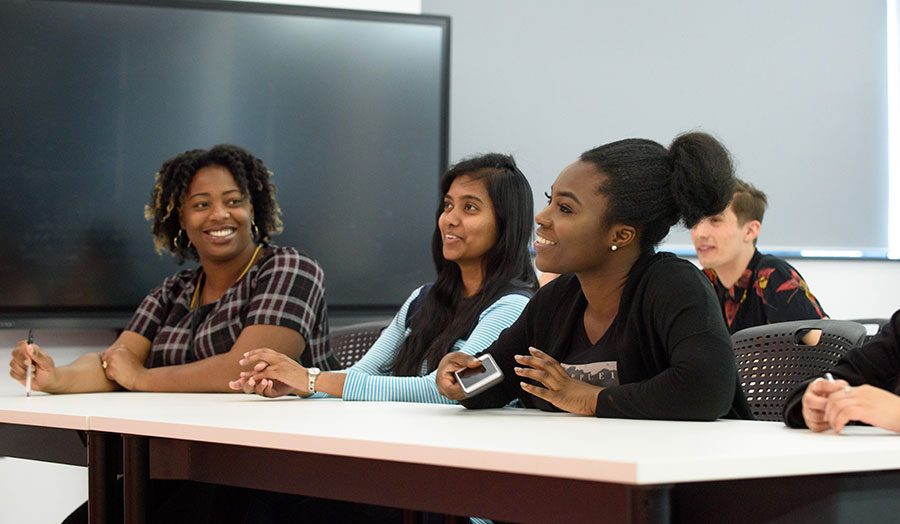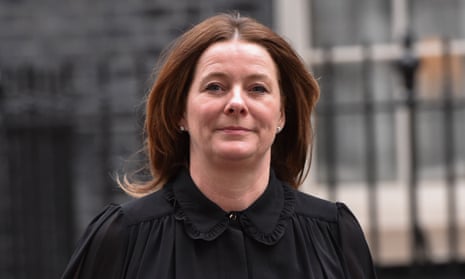- Applying to Uni
- Apprenticeships
- Health & Relationships
- Money & Finance
Personal Statements
- Postgraduate
- U.S Universities
University Interviews
- Vocational Qualifications
- Accommodation
- Budgeting, Money & Finance
- Health & Relationships
- Jobs & Careers
- Socialising
Studying Abroad
- Studying & Revision
- Technology
- University & College Admissions
Guide to GCSE Results Day
Finding a job after school or college
Retaking GCSEs

In this section
Choosing GCSE Subjects
Post-GCSE Options
GCSE Work Experience
GCSE Revision Tips
Why take an Apprenticeship?
Applying for an Apprenticeship
Apprenticeships Interviews
Apprenticeship Wage
Engineering Apprenticeships
What is an Apprenticeship?
Choosing an Apprenticeship
Real Life Apprentices
Degree Apprenticeships
Higher Apprenticeships
A Level Results Day 2024
AS Levels 2024
Clearing Guide 2024
Applying to University
SQA Results Day Guide 2024
BTEC Results Day Guide
Vocational Qualifications Guide
Sixth Form or College
International Baccalaureate
Post 18 options
Finding a Job
Should I take a Gap Year?
Travel Planning
Volunteering
Gap Year Guide
Gap Year Blogs
Applying to Oxbridge
Applying to US Universities
Choosing a Degree
Choosing a University or College
Personal Statement Editing and Review Service
Guide to Freshers' Week
Student Guides
Student Cooking
Student Blogs
- Top Rated Personal Statements
Personal Statement Examples
Writing Your Personal Statement
- Postgraduate Personal Statements
- International Student Personal Statements
- Gap Year Personal Statements
Personal Statement Length Checker
Personal Statement Examples By University
Personal Statement Changes 2025
- Personal Statement Template
Job Interviews
Types of Postgraduate Course
Writing a Postgraduate Personal Statement
Postgraduate Funding
Postgraduate Study
Internships
Choosing A College
Ivy League Universities
Common App Essay Examples
Universal College Application Guide
How To Write A College Admissions Essay
College Rankings
Admissions Tests
Fees & Funding
Scholarships
Budgeting For College
Online Degree
Platinum Express Editing and Review Service
Gold Editing and Review Service
Silver Express Editing and Review Service
UCAS Personal Statement Editing and Review Service
Oxbridge Personal Statement Editing and Review Service
Postgraduate Personal Statement Editing and Review Service
You are here
- Mature Student Personal Statements
- Personal Statements By University
- Accountancy and Finance Personal Statements
- Actuarial Science Personal Statements
- American Studies Personal Statements
- Anthropology Personal Statements
- Archaeology Personal Statements
- Architecture Personal Statements
- Art and Design Personal Statements
- Biochemistry Personal Statements
- Bioengineering Personal Statements
- Biology Personal Statements
- Biomedical Science Personal Statements
- Biotechnology Personal Statements
- Business Management Personal Statement Examples
- Business Personal Statements
- Catering and Food Personal Statements
- Chemistry Personal Statements
- Classics Personal Statements
- Computer Science Personal Statements
- Computing and IT Personal Statements
- Criminology Personal Statements
- Dance Personal Statements
- Dentistry Personal Statements
- Design Personal Statements
- Dietetics Personal Statements
- Drama Personal Statements
- Economics Personal Statement Examples
- Education Personal Statements
- Engineering Personal Statement Examples
- English Personal Statements
- Environment Personal Statements
- Environmental Science Personal Statements
- Event Management Personal Statements
- Fashion Personal Statements
- Film Personal Statements
- Finance Personal Statements
- Forensic Science Personal Statements
- Geography Personal Statements
- Geology Personal Statements
- Health Sciences Personal Statements
- History Personal Statements
- History of Art Personal Statements
- Hotel Management Personal Statements
- International Relations Personal Statements
- International Studies Personal Statements
- Islamic Studies Personal Statements
- Japanese Studies Personal Statements
- Journalism Personal Statements
- Land Economy Personal Statements
- Languages Personal Statements
- Law Personal Statement Examples
- Linguistics Personal Statements
- Management Personal Statements
- Marketing Personal Statements
- Mathematics Personal Statements
- Media Personal Statements
- Medicine Personal Statement Examples
- Midwifery Personal Statements
- Music Personal Statements
- Music Technology Personal Statements
- Natural Sciences Personal Statements
- Neuroscience Personal Statements
- Nursing Personal Statements
- Occupational Therapy Personal Statements
- Osteopathy Personal Statements
- Oxbridge Personal Statements
- Pharmacy Personal Statements
- Philosophy Personal Statements
- Photography Personal Statements
- Physics Personal Statements
- Physiology Personal Statements
- Physiotherapy Personal Statements
- Politics Personal Statements
- Psychology Personal Statement Examples
- Radiography Personal Statements
- Religious Studies Personal Statements
- Social Work Personal Statements
- Sociology Personal Statements
- Sports & Leisure Personal Statements
- Sports Science Personal Statements
- Surveying Personal Statements
- Teacher Training Personal Statements
- Theology Personal Statements
- Travel and Tourism Personal Statements
- Urban Planning Personal Statements
- Veterinary Science Personal Statements
- Zoology Personal Statements
- Personal Statement Editing Service
- Personal Statement Writing Guide
- Submit Your Personal Statement
- Personal Statement Questions 2025
- Personal Statement Changes 2024
Teacher Training Personal Statement Examples

What is a teacher training personal statement?
The teacher training personal statement is your opportunity to let training providers know about your qualities, skills and expertise, and why you want to teach.
While your application form briefly outlines your qualifications, skills and work experience, your teaching personal statement is where your personality shines through.
Take your time with it, be prepared to receive constructive feedback and write a few drafts before you send it off.
How do I write a good teacher training personal statement?
To help you write a successful teacher training personal statement, we recommend you include:
- use examples to back everything up, based on your teaching experience so far
- tailor your personal statement according to the age group you wish to teach
- write using concise English, using first person terms such as 'my' and 'I'
- be original and honest - don't embellish the truth or lie outright
- avoid clichés and general statements, such as 'since a young age' or 'I've always wanted to be a teacher'
- demonstrate your passion and enthusiasm for teaching.
You have up to 4,000 characters to write a memorable opening, middle and conclusion.
Don't waste your valuable space on writing about things that are already on your UCAS form elsewhere, such as your qualifications.
What should I include in my teacher training personal statement?
When planning out your personal statement, ask yourself what it is your training providers are looking for. Make sure your statement answers the following questions:
- Why do I want to teach? - show that you know about the challenges and rewards of teaching, and remember that everything has its ups and downs. Maybe talk about any lessons you have observed/taught, what went well and how you would have improved on them. Discuss teaching styles used and the use of technology in the classroom.
- Why do I want to teach this age group/at this level? - what appeals to you, and what experience do you have teaching these students/children?
- What are my strengths? - include the relevance of your degree and subject knowledge.
- What experience do I have? - include any experience you have of volunteering with children, such as teaching a sports team, youth work or working at a summer camp? Give examples of how this helpd develop your teaching skills.
- What personal skills/abilities do I have? - these might include research, creativity, time management, IT skills, problem solving, managing people, organisational skills, listening skills, leading or working in a team. To strengthen your application, make sure you back everything up with examples.
- Are there are any location restrictions? - if you don't currently live in the UK, why do you want to study here? Are you willing to move away from your current home town/city for your degree?
You only have up to 47 lines (4,000 characters including spaces) in which to persuade your chosen initial teacher training (ITT) providers to offer you an interview. The statement must be concise, enthusiastic and sell your potential to be a successful teacher.
For more help and advice on what to write in your teacher training personal statement, please see:
- Personal Statement Editing Services
- Personal Statement Tips From A Teacher
- Analysis Of A Personal Statement
- The 15th January UCAS Deadline: 4 Ways To Avoid Missing It
- Personal Statement FAQs
- Personal Statement Timeline
- 10 Top Personal Statement Writing Tips
- What To Do If You Miss The 15th January UCAS Deadline.
What is a teacher training degree?
Teacher training degrees combine the study of curriculum subjects with learning teaching techniques and putting these into practice during hands-on school placements. The course leads to QTS (qualified teacher status) to enable you to teach in a school or college.
How long is a teacher training course?
To teach in England and Wales you need to gain QTS. You will obtain this on an ITT programme, which could be school or university-based and takes approximately one year to complete.
How do I become a teacher with a degree?
To teach as a qualified teacher in England, you'll need qualified teacher status (QTS). If you already have a degree, you can complete a postgraduate teacher training course to achieve this. Additionally, you'll need to have a GCSE at grade C/4 in maths and English, as well as science if you want to teach primary.
Can I train to be a teacher without a degree?
Unfortunately no - you cannot become a teacher without a degree.
But if you are an undergraduate or have a degree in a different subject than what you want to teach, there are options to help you get into a teaching career.
Will I get paid for teacher training?
There are three types of funding available for teacher training - depending on your circumstances, you could receive all three:
- Tax-free bursary or scholarship.
- Tuition Fee Loan and Maintenance Loan.
- Extra financial support if you're a parent, have an adult dependant or a disability.
Further information
For more tips and advice on teacher training personal statements, please see:
- GetIntoTeaching
- The Complete University Guide
Related resources
Teacher training interview questions.

Find out more
Applying For Teacher Training Courses

6 Personal Statement Writing Tips

How To Apply To University

UCAS Adjustment: How Does It Work?

A Level Results Day

Clearing Guide

Clearing Universities & Courses
Clearing advice.
Recommended Clearing Universities
Popular Course Categories
Course search & discover.
Start the search for your uni. Filter from hundreds of universities based on your preferences.
Search by Type
Search by region.
Recommended Universities

Ravensbourne University London
London (Greater) · 88% Recommended
.jpg)
The University of Law
London (Greater) · 92% Recommended

University of Kent
South East England · 96% Recommended
Search Open Days
What's new at Uni Compare

University of Sunderland
Unlock your potential at one of the world’s best young universities (THE, 2023).

Staffordshire University
Apply to the uni ranked 2nd for quality teaching (THE, 23).
Ranking Categories
Regional rankings.
More Rankings
Top 100 Universities
Taken from 65,000+ data points from students attending university to help future generations
About our Rankings
Discover university rankings devised from data collected from current students.
Guide Categories
Advice categories, recommended articles, popular statement examples, statement advice.

What to include in a Personal Statement

Personal Statement Tips
Personal statement examples teacher training personal statements.
Discover personal statement examples written by students accepted onto teacher training and related courses. Read through the examples to help shape your own personal statement.
Teacher Training Personal Statements
Submitted by anonymous
Education (Primary) Personal Statement
I believe teachers are given the opportunity to set the foundations o...
Child Integrated Professional Care Personal Statement
My passion for midwifery has grown with time. At 15 I made the decisi...
Submitted by Lubay
Childhood Studies Personal Statement
Children should have somebody that believes in them and supports them...
Submitted by Jordon
Teaching Personal Statement
My ambition is to one day become a teacher. Personally, I have had a ...
Submitted by Lauren
BA for Primary Education (QTS) Personal Statement
The role of a teacher demands a hardworking, assiduous and empathetic...
Submitted by Lily
Primary Education Personal Statement
“Let’s play teachers, I’ll be Miss Lily”: the words that led me to re...
Submitted by Megan
Primary Education
I believe that teachers have one of the greatest impacts on every ind...
Submitted by Rahmina
Education Studies
Psychologists, such as Jean Piaget, have argued that a child’s intell...
Teacher Training Personal Statement Advice
If you want to know how to write a personal statement for teacher training, we’ve got just the thing for you. Keep reading for teacher training personal statement help and a boatload of inspirational teacher training personal statement examples. Whether it’s a personal statement for primary teacher training at undergraduate level, or a PGCE teacher training personal statement after a degree in a main subject, you’ll need a personal statement to apply. A personal statement for teaching course applications accompanies your grades and reference to give a fuller impression of who you are. It should include your strengths, experiences and ambitions. Writing a good personal statement for teacher training is essential; training includes a large amount of teaching time, so the course leaders want to make sure you can handle that responsibility. Before you pick up a pen, read our teaching personal statement examples here to get a better idea of what’s expected. You’ll notice that strong candidates use evidence to demonstrate their skills, while writing in a clear, formal, but friendly way. When pondering how to start a personal statement for teacher training, try starting with what inspires your drive to teach. Perhaps you’re on a mission to revolutionise maths, or you had an amazing teacher at school, or you’ve been excited to see how positively young people responded to learning an instrument when you volunteered at summer camp. Whatever it is, speak from the heart. When you’ve drafted (and redrafted) something, send your sample teacher training personal statement to a teacher for some feedback. Better they catch your mistakes than the admissions tutors! There’s no finite list of what to write in a personal statement for teacher training. Consider the qualities they will be looking for in a trainee teacher, and think about whether you can demonstrate those skills. Teachers need to have great communication skills. A part-time job as a customer service assistant in retail, for example, would be evidence of this. It’s important to have lots of empathy as you’ll be working with all kinds of children with their own complicated lives and feelings. A voluntary role in a youth club, work experience at an animal shelter, or running a sponsored marathon for charity are just a few examples of ways in which you might demonstrate empathy. Of course, you have to love your subject if you’re a secondary teacher. Talk about what excites you about English / Physics / Geography… For primary, you need to be confident in a range of subjects. Look at our primary teacher training personal statement examples to see how students might show this.
Want to learn more about a university?
Get your questions answered by sending them an enquiry now.
Find the latest from Uni Compare

Bath Spa University
Pick Bath Spa, awarded the Uni of the Year for Social Inclusion!

University of East London
The University of East London has been shortlisted as the Uni of the Year! (THE 2023)
- Sign up for emails
- Find an event
Your teacher training personal statement
Your personal statement is your chance to make yourself memorable with teacher training providers and show them why you’ll make a great teacher.
You do not have to write it all at once – you can start it and come back to it. Successful candidates often take a few weeks to write their personal statements.
How long should my teacher training personal statement be?
Your personal statement can be up to 1000 words. 90% of successful candidates write 500 words or more.
You could include:
- skills you have that are relevant to teaching
- any experience of working with young people
- your understanding of why teaching is important
- your reasons for wanting to train to be a teacher
- any activities you’ve done that could be relevant to teaching (such as first aid courses, sports coaching or volunteering)
Teacher training providers want to see your passion and that you understand the bigger picture of teaching.
How to write your personal statement
When writing your personal statement you should make sure you check your spelling and grammar in your application. You want to make the best possible impression.
You can use ChatGPT or other artificial intelligence (AI) tools to help you write your personal statement. You should not rely on it to write your entire statement because:
AI tools use bland language and will not be able to give details about you as a person. Using them may result in your application being unsuccessful
your account to apply for teacher training may be blocked if you consistently submit personal statements that look like they have been written with AI tools
Do I use the same personal statement for each application?
You can use the same personal statement for every course you apply to.
However, there may be some instances where you’d like to tailor it to different courses.
For example, if you want to apply to train to teach maths and also to train to teach physics. In this case, you might want to change your personal statement to talk more specifically about the subject you’re applying to train to teach.
Should my personal statement be different if I’m training to teach primary or secondary?
You should use your personal statement to explain why you feel passionate about teaching a specific age range or subject.
If you’re applying for a primary course with a subject specialism, or you’re particularly interested in certain primary subjects, you can talk about that, too.
If you’re not sure if you want to teach primary or secondary, you can find out more about teaching different age groups .
Do I need school experience?
You do not need school experience to apply for teacher training, but it can help strengthen your personal statement.
Teacher training providers like to see that you have a good understanding of teaching, how the school system works and what your transferable skills are. You need more than just good subject knowledge and school experience can be a great way to get this.
Getting some school experience can also be a good way to make sure teaching is right for you before you apply for a course.
Find out how you could get school experience .
Get help with your personal statement
You can get help with your personal statement from our teacher training advisers . They have years of teaching experience and can give you free, one-to-one support by phone, text, or email.
Advisers can also help you understand more about what teaching is really like, which can help improve your application.
Start your application
Create an account and start your application for a teacher training course.
Apply for a course
Get free one-to-one support
Maximise your chances of submitting a successful application with the support of a dedicated adviser with years of teaching experience. Chat to an adviser through phone, text or email.
Chat online
Chat is closed
Chat not available Email: [email protected]
0800 389 2500
Call or chat to us Monday to Friday, 8:30am until 5:30pm , except on bank holidays (opens in new window) .
Whether it's just an idea or you're ready to apply, you could get personalised support from an adviser with years of teaching experience. Chat to them by phone, email or text as little or as often as you need.
We use cookies to collect information about how you use this website. We use this information to make the website work as well as possible, and improve this website. We also share some of this information with our social media, advertising and analytics partners.
Dark background
Light background
Text only mode
How to get into teaching
How to write your teacher training personal statement
Your teacher training personal statement should express why you'd make a great teacher and spell out your experiences, qualities and skills. We've got the inside track from Admissions Tutors on how to go about writing a good teacher training personal statement, what to do and what not to overlook...
6 minute read
Share to: Facebook , LinkedIn , Twitter
Let's start with a look at when to apply for teacher training. Places on teacher training courses are filled on a first come first serve basis. This is due to two factors. Firstly, the Department for Education set the maximum number of trainees on some courses. But the thing that really limits the number of places available is ensuring that there are enough school placements for all trainees. Training providers can only recruit up to a number that is manageable in terms of providing the trainees with the placement experiences they need.

Places for the most popular subjects tend to go early, for example, Physical Education (PE), Primary and Psychology. Shortage subjects such as Chemistry, Computing, Maths and Physics don’t fill up so fast.
The route you are taking into teaching may also influence when you apply. School Direct is run by the schools themselves and they can only take as many trainees as they can train within their schools. They may only have the one place available for your chosen subject and once those placements are gone, they’re gone. Universities tend to have larger and wider networks of partner schools which provide school placements. This gives them more options for finding school placements so they may have places available for longer. Unlike School Direct you don’t get to choose exactly which school you go to, though they’ll try to match your school placements to your preferences as much as possible. If you apply late you run the risk that all the placements are gone.
So, you want to apply as soon as you can, with a brilliant personal statement that reflects who you are and why you want to become a teacher. So, what does that look like?
Your teacher training personal statement broadly needs to convey four things:
- Your passion for wanting to become a teacher and commitment to the profession.
- Your reasons for wanting to teach your chosen subject.
- The skills and experience that you’ll bring to the role of teacher.
- Your awareness of the realities of what lies ahead - it’s a challenging but rewarding role so you need to be realistic about this and be aware of some of the hot topics facing the sector.
Kate Brimacombe, Associate Professor of Education and Associate Director of the Teacher Education Partnership at Plymouth Marjon University, explains what she is looking for in a teacher training personal statement:
“It's really lovely to get something that's individual and firstly I want to see that passion for wanting to work with children. You absolutely can get that across - it comes off the page.
“It can’t feel half-hearted, it needs to feel committed. If independence, motivation, and self-reliance don’t sing off the page, then that's an error in a sense. You need to get your personality into the written word, I’m looking for that fire that says ‘this is absolutely what I want to do’. One common mistake is being too short so that it doesn’t get that passion across. The lack of content and desire are the main reasons I don't shortlist candidates.”
You must convey why you want to teach your subject. What is your expertise? Why do you love it? What are the challenges facing teachers of your subject? Why do you want to teach this? Think about the age group you’ll be teaching and discuss why you want to teach them. What relevant experience do you have? How does your experience to date influence your thinking?
Ultimately, you’ve got to inspire others to love your subject, so be clear about how your own relationship to it is going to enable this.
The ingredients of a convincing teacher training personal statement are:
- Passion for teaching. Express your drive and fire on the page.
- Be individual. Stand out in a positive light; one tip here is not to waste characters on quotes, they don’t say anything about you.
- Convey your desire to work with children. Explain where this comes from.
- Prove it. Include the things you have actively done, what you’ve learnt from real life experiences in schools and/or working with children, and what you got out of it.
- Demonstrate the qualities of a teacher. Point out your commitment, empathy, independence, innovation, motivation, patience, self-reliance, and tip-top organisation skills.
- Depth. Don’t cut it too short, you’re allowed up to 4000 characters which is around 600-700 words, so write until you’re thereabouts, and then edit it so that it reads even better.
In addition, for a strong personal statement you’ll want to demonstrate some awareness of the national curriculum for your subject and then highlight how your subject knowledge maps to it.
Back to Kate for another crucial tip: “The other big thing is that we’re checking the accuracy of your spelling and grammar, it must be correct if you’re going to be a teacher. To be fair, we don't get a lot of mistakes because I think people understand that expectations around written and verbal communication are high in teaching.”
Some aspiring teachers know they want to teach but are uncertain on the age group or subject. For example, maybe you love sport and are keen to be a secondary PE teacher, but you also enjoy working with younger children at sports clubs so you’re feeling split. In this scenario, try to settle this before you apply but if you can’t then write honestly about the situation and take extra care to ensure that neither option comes across being the fallback one that you’re not really committed to.
The magic ingredient: Examples from your own experience
There's no one way to structure your teacher training personal statement but be sure to back up every point you make with evidence. A great way to do this is give real life examples of what you actually did, and what you learned from it. It’s not enough to just list your work experience, you need to explain what you learned and how this experience will help you as a teacher.
You don’t need school experience to apply for a teaching course, though it helps. But if you don’t have school experience then you at least need some transferable skills, so any other experience of working with children is valid here, things like helping with sports teams and youth clubs are valid too. Use your examples to demonstrate the skills you’d bring to the role of teacher.
You could also refer to a teacher who made a difference to you at school, or who influenced your love of working with children and helping them to learn.
By discussing examples, you can also demonstrate that you are realistic about the role, in that is challenging as well as rewarding. For example, you might discuss a session you observed or taught, reflecting on what went well, how you adapted to the situation and how you would improve on it.
This is how to make effective use of real life examples, according to Julie Stevens, course leader for PGCE Secondary Education at Plymouth Marjon University: “I want to read about how you’ve helped a pupil to make progress. What did you change? How did you recognise they weren’t learning? What did you adapt to help them understand? Maybe you modelled it or talked it through? How did the child respond? You might talk for example about why a child was messing around or why a seating chart was put together in a certain way. It’s really encouraging when a candidate offers insights into teaching and that sense of self-reflection”.
You can talk about that examples that demonstrate transferable skills. For example, maybe you had to be resilient to get your Duke of Edinburgh award, maybe you’re a leader on the sports field or maybe you’re a dedicated musician with the music exams to prove it?
In addition, the way you talk about children is really important, the training provider needs to know that you see them as individuals and that you want to help them become independent thinkers. Back to Julie again for more about this: “I want to see candidates who talk about children as individuals and how you can help them make the best progress they can. Helping young people to make decisions for themselves and become independent learners, so that they take responsibility for their own success is essential for adulthood.
"It’s great when someone can talk about innovative things, like how to use social media for good outcomes. Anything like that is powerful because it means they understand our role as educators – we aren’t just filling them with knowledge, we're trying to get children and young people to understand how to develop themselves.”
Get your referee geared up
References really do matter. Julie and Kate report that in practice most of barriers to shortlisting a candidate come not from the personal statement, but from references that are too short. They’ve seen references as short as three lines and that doesn’t tell them enough about you and your suitability for a career in teaching. You could be an impressive candidate, but you can’t be offered a place until your reference checks out.
If you’re applying for undergraduate teacher training through UCAS then one reference is required. If you’re applying for postgraduate teacher training then you’ll need two references. If you’re at university, or have been within the past five years, then one reference must be from someone at your university. The other reference can be from someone who knows you from work, and if you’re applying for School Direct then one of your references must come from your current employer.
A good reference says good things about you and backs up some of qualities and skills you’ve outlined in your personal statement. Your referee needs to talk about your character and why they think you could be a great teacher. The training provider is looking for insight; a different perspective on you, and hopefully one that that verifies the impressions they’re taking from your statement.
You can do a lot to make sure your reference is on point. First ask your referees if they are willing to be your referee and if they think you’ve got the potential to be a good teacher. Next you need to arm them with all the arguments as to why you’ll be a good teacher, they probably don’t know everything you do. Ideally they would read your personal statement so that they can write a reference that complements it.
If applicable, ask your referee to comment on your academic abilities, including your predicted grades. If possible, go through the reference with your referee as you might see something they’ve missed. If so, ask if they are willing to add it, it’s up to them but you can suggest things.
A good teacher training personal statement shows passion and love for teaching, as well as that you’ve done some research and that you’re dedicated to teaching career. Show your personality; show them the teacher you could be. @marjonuni
Back to Kate for closing advice: “Speak with honesty and speak from the heart. I’m looking for passion. I'm looking for somebody I think the has the potential. Then when you come to interview, I already know that you have that passion and so you just need to add the shine to that and tell us more about it in-person, one to one. In that way your teacher training personal statement is the stepping stone into the interview, if it does its job then we’ll be excited to find out more about you”.
You’ve got this. Follow the advice above and you’ll have a brilliant teacher training personal statement in the bag. The next step will be your teacher training interview, so why not check out our articles on how to ace your teacher training interview and teacher training interview questions .
Share this page on

- PGCE 3 – 7
- PGCE 5 – 11
- Assessment Only
- HLTA Status Course
- Our Schools
- Personal Statement Tips
TIPS FOR PERSONAL STATEMENT
How to write an effective personal statement.
Please take time to read the following information which is designed to help you to write your personal statement effectively.
• Remember , the function of the personal statement is to secure an interview • Wring value out of every sentence you put in, cut the waffle • Be clear – don’t make assumptions about the reader’s knowledge • Use concrete examples . If you did something, say exactly what you did (e.g. As a TA I have supported children to develop a range of skills in mathematics. I used a cookery lesson to teach my Y5 pupils about weighing and measuring and have taught volume and capacity to Y1 pupils as part of a topic on looking after our fish) • Say what you learned (e.g. Whilst observing in a Y3 class, I was impressed at the way the pupils responded to the Learning Objectives. I understand how important it is to make these explicit as it helps the children to …) Broadly, the statement should cover these areas: • Why you want to become a teacher • your transferable skills, knowledge and experience relevant to teaching and what they will enable you to offer a school • your philosophy of education – what it’s all about (and this might be where you want to include your thoughts on things like inclusion); • what other transferable skills, knowledge and experience you can offer, including extra-curricular. • Try to include something ‘desirable’ – that little something which will make your application stand out e.g. Willing and able to coach the school football or netball team.

Final Do’s and Don’ts
Don’t: Go over the character limit – the form will just cut you off mid-sentence. Do: • Keep a copy of your application form – you will be asked questions based on it at interview • Draft your statement on Word first then cut and paste. • Proof read very carefully – errors in written English are frowned upon • Get someone else to read over your form before you press send Good Luck!
“LDBS SCITT was genuinely the best year of my life.” – Jade Corrick
© 2024 | Teaching London: LDBS SCITT | 2 West End Lane, Kilburn, London, NW6 4NT | 0207 932 1126 | [email protected]
- Schools directory
- Back issues
- New Teachers
- Resources Jobs Schools directory News Search
How to write the perfect teaching personal statement
Application and interview, tes editorial.

When applying for a new job, you may be competing with tens or hundreds of other applicants in a race for the role.
The HR manager or headteacher recruiting for the job will be scrutinising every detail of your application to make sure they are bringing in the right people for interview.
The application form is the first hurdle you have to get over and sets the first impression of you as a person in the recruiter’s mind.
- Advice on honing your job search
- How to write a personal statement for teacher training
- How to write a must-read CV
The personal statement: why does it matter?
The personal statement presents the perfect opportunity to show you are an exceptional candidate, understand teaching and know the school you are applying to.
It is not an easy task and is a tricky thing to get right. It requires being concise and clear – it shouldn’t be too long or read like a list.
You should talk about yourself and your professional achievements, while at the same time apply those experiences to the school itself.
We spoke to Malcolm Trobe, deputy general secretary of the Association of School and College Leaders , about what goes into the perfect personal statement. Here's what he said:
What does a great teaching personal statement look like?
"In general, I would say no longer than two sides of A4 – typescript. It needs to be well structured and linked to the specific school. It will need to include a number of key areas, including behavioural management, educational philosophy, subject expertise, pedagogy, personal organisation and skills and enrichment activities that the candidate can bring."
What should it contain?
"I would recommend that candidates include three elements in each of the key areas:
- What their beliefs/philosophy/approach is – i.e., the theory
- Their experience in that area
- How they would use that experience in the school they are applying to and specific to the job they are applying for
The statement should also include something personal in terms of their outside interests to indicate that they live an interesting and well-balanced life."
What are school leaders looking to read in a good personal statement?
"They will want to see something of the person’s character come through. It must not be just a list of achievements or repeat of the CV. It needs to be well-written, error-free and mention the school they are applying for – but not too many times. It should read as if it has been specifically written for the school and job they are applying for. I would be looking for something similar to the approach I have indicated above, covering all of the key areas and indicating that they have a vocation for working with young people. Somehow I would like to see a ‘generosity of spirit’ come through in the statement."
How can a candidate stand out in a personal statement?
"A good personal statement needs to include something of the person themselves. It has to make the reader believe that the candidate has something special without bragging or appearing arrogant – but something a bit above what other candidates may offer. A really good introduction and ending are important, and it's worth spending a great deal of time crafting those sections of the statement. Hook the reader in at the beginning and finish on a high note so that they want to meet the person and explore what has been written."
Want to keep up with the latest career advice? Follow Tes Jobs on Twitter and like Tes Jobs on Facebook
We value your privacy
We use cookies to allow this site to work for you, improve your user experience, and to serve you advertising tailored to your interests. Let us know if you agree to all cookies. You can manage your preferences at any time
Your Privacy
We use cookies, which are small text files placed on your computer, to allow the site to work for you, improve your user experience, to provide us with information about how our site is used, and to deliver personalised ads which help fund our work and deliver our service to you for free.
The information does not usually directly identify you, but it can give you a more personalised web experience.
You can accept all, or else manage cookies individually. However, blocking some types of cookies may affect your experience of the site and the services we are able to offer.
You can change your cookies preference at any time by visiting our Cookies Notice page. Please remember to clear your browsing data and cookies when you change your cookies preferences. This will remove all cookies previously placed on your browser.
For more detailed information about the cookies we use, or how to clear your browser cookies data see our Cookies Notice
Manage consent preferences
These cookies are necessary for the website to function and cannot be switched off in our systems.
They are essential for you to browse the website and use its features.
You can set your browser to block or alert you about these cookies, but some parts of the site will not then work. We can’t identify you from these cookies.
These help us personalise our sites for you by remembering your preferences and settings. They may be set by us or by third party providers, whose services we have added to our pages. If you do not allow these cookies, then these services may not function properly.
These cookies allow us to count visits and see where our traffic comes from, so we can measure and improve the performance of our site. They help us to know which pages are popular and see how visitors move around the site. The cookies cannot directly identify any individual users.
If you do not allow these cookies we will not know when you have visited our site and will not be able to improve its performance for you.
These cookies may be set through our site by social media services or our advertising partners. Social media cookies enable you to share our content with your friends and networks. They can track your browser across other sites and build up a profile of your interests. If you do not allow these cookies you may not be able to see or use the content sharing tools.
Advertising cookies may be used to build a profile of your interests and show you relevant adverts on other sites. They do not store directly personal information, but work by uniquely identifying your browser and internet device. If you do not allow these cookies, you will still see ads, but they won’t be tailored to your interests.
The shortcut to your shortlist
Make your university search faster and less stressful. Get a personalised shortlist by selecting what matters to you.
- CHOOSE ONE OR MORE
Popular universities
- University of Kent
- University of East Anglia UEA
- University of Chester
- Coventry University
- University of Aberdeen
- University of Portmouth
- Nottingham Trent University
- University of Sunderland
- London Metropolitan University
- London South Bank University
- University of East London
- BROWSE ALL UNIVERSITIES
Course search
Popular undergraduate courses.
- Computer Science
- LLB Bachelor of Laws
- Biomedical Sciences
- Physiotherapy
- Sports Science
Open days search
Upcoming open days.
- University of Essex
- BIMM University
- University of Wales Trinity Saint David
- Arts University Bournemouth
Article search
Popular articles.
- What is UCAS Extra?
- Replying to offers
- What's a university open day
- Student finance and funding
- Types of degree in the UK
- BROWSE ALL ARTICLES
Popular topics
- Choosing what to study
- Choosing where to study
- Applying to university
- League tables
- Student life - after you start
Tips for writing your teacher training personal statement
When applying for teacher training, you’ll have to submit a personal statement. follow our advice on how to show your full potential..

Include genuine and realistic reasons for wanting to teach
You’ll need to outline the reasons you want to teach. These reasons should be compelling. Applicants regularly reel out clichés, for example: 'I want to give back to society' or 'I want to help children'. Although true, what is it exactly you want to give back, and how does teaching help children?
Your reasons need to be developed and realistic. Teaching kids algebra isn’t going to solve the world’s problems. It might make a difference to individual lives, but how so? Don’t forget teaching has a lot to offer you too. Show your awareness of that.
Demonstrate your understanding of the challenges and rewards involved
Teaching can be a challenging profession – make sure you show your recognition of this. But, it can also be an extremely rewarding experience, so don’t forget to include the positives.
Show how your experience in schools helped you to understand the role of a teacher
You’re unlikely to be admitted to a teacher training programme without relevant experience. Make sure to include these details in your personal statement.
Don’t simply recall your experience as a teaching assistant. Relay what the experience meant to you and how it helped you understand what teachers actually do.
If you have experience of working with children in other capacities, include the details
Maybe you were a mentor in a summer camp for children, or you ran a local youth sports team. It’s all relevant. Mention how the experience will help your career in teaching. If nothing else, working with children will have developed your ability to build a rapport with them.
- READ MORE
- University interviews
- Tips for virtual interviews
- Completing your UCAS application
Draw on other professional experiences and say how they’re relevant
Teaching calls for a variety of skills. You might have experience in managing people, working within a team or communicating across departments. These are all applicable, so include them and make sure to say how these skills will help you succeed as a teacher.
Don’t forget about your subject
Tailor your application according to the subject you hope to teach. This is especially important if you’re applying for secondary school training posts. What makes you an expert in the field? What are the challenges facing teachers of your subject? Why do you want to teach it?
If applying from outside the UK, explain why you want to train here
This could simply be a personal reason or otherwise. Admissions tutors want to know you’re serious about training in the UK.
Don’t waffle
Space is limited to around 4,000 characters across 47 lines – make sure every sentence counts.
Give yourself plenty of time
Don’t leave the personal statement until the day before the deadline. You’ll need time to proof and edit it to make it strong and complete.
- See university deadlines
Don’t keep it to yourself
Try to get feedback on your personal statement from a teacher you know, as well as a university tutor – they’re likely to have a unique insight.
Bear in mind who you’re writing it for
Are you applying for school-based or university-based training? This should have some impact on your personal statement, as a university may be looking for something different to what a school wants. Perhaps this will influence whose feedback you’ll listen to more closely.
Get the basics right
Consult DfE’s guide to make sure you’ve done everything correctly. Triple-check everything and take breaks between writing and editing. It’s hard to spot errors when you’re staring at your work for long periods of time.
Related articles

What are university rankings?
University rankings, or league tables, rank universities overall and by a number of...

How to use the league tables
Use our university rankings to narrow down your choice of unis. Compare UK universities...

Why use our university league tables?
Our university league tables, or rankings, provide you with information about each UK...
Is this page useful?
Sorry about that..., how can we improve it, thanks for your feedback.

Crafting a Compelling Teaching Personal Statement
Your teaching personal statement needs to give an insight into your personality, teaching style & unique qualities only you hold. In this article, we’ll guide you through the process of writing a compelling teaching personal statement.
The best personal statements are more than just a list of experiences and achievements. A personal statement which tells a compelling story will always compel the reader to want to find out more. If you keep your philosophy as the central theme and ensure that you use examples of practice which link back to that, it will ensure that your personal statement is a coherent and interesting piece of writing.
What Inspired You:
Begin by reflecting on what motivated you to become a teacher. Headteachers want to understand your background, inspiration, the reason you trained as a teacher and why you want to teach your specialism. Highlight your passion for teaching and your genuine desire to make a positive impact on students’ lives.
Showcase Key Achievements:
Highlight your career achievements, qualifications and teaching milestones that you’re most proud of. Demonstrate your ability to drive student progress and results through concrete examples throughout your teaching personal statement. If you’re an early career teacher, discuss your teaching placements, voluntary work, or even include any quotes from observation reports.
Showcase Teaching Skills:
Demonstrate your teaching skills by providing specific examples. Discuss successful teaching strategies you’ve employed, innovative lesson plans you’ve created, or how you’ve adapted to meet the needs of diverse learners. Highlight any extracurricular involvement, such as coaching sports teams or leading clubs, which showcases your dedication to students’ holistic development.
Keep It Concise and Well-Structured:
Teaching personal statements should be clear, concise, and well-structured. Aim for a maximum of 500-600 words. Use headings or bullet points to organize your content. Start with a captivating opening paragraph and conclude with a strong summary of your qualifications and enthusiasm for teaching.
Proofread and Edit:
Thoroughly proofread your teaching personal statement to eliminate grammatical errors, typos, or awkward phrasing. Consider seeking feedback from mentors, colleagues, or friends to ensure clarity and impact. Editing is crucial to present yourself as a professional and detail-oriented teacher.
Show Enthusiasm:
Infuse your teaching personal statement with enthusiasm and optimism. Convey your passion for teaching, showcase your qualifications, and demonstrate your commitment to fostering student growth. A positive and enthusiastic tone can be infectious and leave a lasting impression.
To conclude, your teaching personal statement is your chance to shine as a teacher. Get personal. Write about what makes YOU in the classroom.
For further support and tips, please reach out to Gemma Yates.
If you’re an ECT, click here for tips on how to land your ECT role
If you’re an experienced teacher looking to accelerate your career, click here
Latest Updates

Advance Your Teaching Career

A How-to Guide: Landing Your ECT Role
0203 621 6321
Copyright © 2024 Ethos Education | All Rights Reserved | Web Design Surrey
Privacy Overview

[email protected]
+44 (0) 208 336 6164.
- Sep 11, 2017
How to write your personal statement for teacher training

In many ways, writing your personal statement for teacher training is not that dissimilar from your original UCAS statement for your undergraduate degree. The character restriction is the same (4,000 characters) and, just as you could only have one personal statement for all of your undergraduate universities, you have the same personal statement for both Apply 1 and Apply 2.
The content should focus heavily on your passion for education and how you see your career developing as a teacher. You should consider the skills you have, and how they make you well equipped for the challenges that lie ahead. Teaching is not an easy career path, and admissions tutors like to see an understanding of this from applicants.
It is fairly common for people interested in pursuing a career in Education to be driven by their own educational experiences. On occasion it is an individual who believed in, or otherwise inspired them, on others it can be more generalised support. You should reflect on your own motivations, and expand upon these in your statement. Everyone’s reasons are slightly different, and it will give the admissions tutors more of an insight into you as an individual- this can help you to stand out.
A number of applicants will have had work experience, either in a school, or working with children in a slightly different environment. It is important for you to talk about this in detail. Perhaps you have worked with children who have learning disabilities, at a youth- or after-school club, or summer camp where the children come from a range of different backgrounds, ages, and abilities. Alternatively, you might have taken part in the School Experiences Programme. Whatever you have done, these experiences will have taught you valuable lessons, and an awareness of the skills you have acquired and developed as a result is key.
Whilst a number of applicants who are looking to enter teaching are able to move to train, and then to work, there are others who, for whatever reason, are unable to relocate. This could be due to personal, or familial circumstances. If you feel that you need to stay in a particular region, it is important to mention that in your personal statement, along with a brief reason. This will help the institutions to which you have applied gain a deeper understanding of your needs, and to support those in whatever ways they can. It is far better to mention your preferences at the point of application, rather than further into the process.
You will probably find, when you consider all of the above points, that it is difficult to write all that you want to say in 4,000 characters or fewer. The first step is to write all that you would like to include, disregarding the limitation. This is to ensure that your foundations of the personal statement are as genuine as possible, and for a career like teaching, that is essential. Once you have this working draft, you should read through it again and see whether there are any obvious sections which could be written more succinctly. Depending on your writing style, you should be able to make at least some cuts on your first read-through of the statement.
Unless time is of the essence, it would be a good idea at this point to take a break from editing, and return to it after a few hours or even a day or two to read through it again. It is likely that, during the time you have had away from the statement, your mind will have been reflecting further on the content, and, even though you may not realise it, you will be thinking about which points to prioritise, and other things you might want to include, and others to delete. This is an important part of the process, and it should, in theory, reduce the number of drafts you have before you have your final version.
When you revisit your statement for a second, or third, time, you should have a much firmer idea of the key points to include. You need to remember that you won’t be able to include everything, but that is the same for the majority of applicants. At this stage, you should prioritise what you think makes you stand out. It might be your reason for deciding to become a teacher, or the experience you have gained, but it is what will help you to shine against the competition.
If you have any friends or colleagues who are teachers, or work in Education more broadly, you might like to ask them to read your personal statement to see if they believe that it captures all of your strengths. At times, it can be difficult to identify exactly what you possess which would make you an excellent teacher. All teachers are different, and asking third parties who know you well can help you to gain some perspective and objectivity.
Ideally, you should give yourself at least a couple of weeks to construct your personal statement, as this will give you time to take breaks between drafts, and this is important to give yourself time to reflect. As with all applications, preparation is key, and if you can identify and focus on your strengths, you should be able to submit a strong personal statement which highlights not just your passion for education and desire to shape future generations, but also the unique skills you have which make you worthy of a place.
- University Applications
Recent Posts
I’m applying to Oxbridge. Should I make an open application?
How can I show enthusiasm for my chosen degree course?
How should I choose my degree?
- Skip to content
How to write your personal statement for teacher training
Gemma Fairclough
Last updated: 28 Sept 2023, 09:24
The information in this article is based on the Apply for Teacher Training service personal statement, with hints and tips that will be useful when completing the form.
In partnership with:

Your personal statement is a crucial part of the application and your chance to stand out from the crowd. You should write between 500 and 1000 words for your personal statement. See two sample personal statements at the end of this article.
Your statement must be concise, enthusiastic and sell your potential to be a successful teacher. It should explain why you want to teach, your suitability to teach that age group, and/or your chosen subject (if you’re applying for secondary teaching). Here are some ideas on what to write about in your personal statement:
- Your interest in the subject or age group you want to teach.
- An appraisal of the demands and rewards of teaching, with evidence of your motivation, showing an understanding of teacher training and the role of a teacher.
- The skills and qualities that would make you an effective teacher, such as communication, teamworking and leadership. You can evidence how you have developed these using examples from your degree and work experience.
- How you could contribute to a school outside of the classroom, for example, giving details of any specific skills that you have, that could be useful for the range of extracurricular activities the schools provide.
- Any school work experience you have. You might discuss areas of the national curriculum you observed, age groups you worked with, subjects you covered and types of schools you visited (and for how long).
- Any other experience working with children or young people, and what you learned from this.
- Any other activities you have undertaken, such as first aid courses or volunteering, reflecting on how the skills you have gained will help you become an effective teacher.
- Your thoughts on welfare and education.
- The subject of your undergraduate degree and/or relevant modules you studied as part of your degree. You could also talk about your A Level subjects, postgraduate qualifications (if applicable), or expertise you’ve gained at work if this is relevant for the subject or age group you want to teach.
- If you are applying for primary courses, you could mention any specialist knowledge relevant to teaching the range of subjects in the national curriculum.
If you do not currently live in the UK, explain why you want to study in the UK; if relevant, provide evidence (through UK ENIC for example) that your qualifications are at the required standard. Check that your language skills are sufficient to complete the training programme as requirements vary between institutions.
Explain anything not made clear elsewhere on the application, such as reasons for gaps in your education or working life.
Tips for writing and checking your personal statement
- Remember that you can only write one personal statement for all your choices, so make sure it reflects the route or routes you have applied for.
- Give yourself enough time to write a few drafts.
- Write your statement using a word processing programme so you can check it for spelling and grammar errors. Cut and paste it into the application form as you go along to make sure you do not go over your word limit.
- Keep it simple and natural in style.
- Personalise your statement by writing in the first person, using 'me', 'I' and 'my'.
- Use action verbs such as 'coordinated', 'established' and 'managed'.
- Provide evidence of your motivation, experiences and qualifications as well as your understanding of teacher training and the role of a teacher.
- As the word count is limited for each section, make sure each sentence contributes something useful.
- Show your personal statement to a school recruiter, careers adviser or tutor for feedback.
- Copy your application, particularly the personal statement, before sending it so that you can remind yourself of the content when going for interviews.
- Make sure the personal statement is all your own work, as all statements are put through the CopyCatch similarity detection system.
Discover our top tips for writing a more refined personal statement by reading how to write a great personal statement for a teaching job .
Note: if you’ve already started to apply before the next application cycle begins in September 2023, you may see two sections for your personal statement instead of just one. This includes a section on “why you want to teach” (maximum 600 words) and “your suitability to teach a subject or age group” (maximum 400 words). If your application is unsuccessful this time and you apply again, the two sections of your personal statement will merge. When this happens, you will be asked to review your statement before applying again.
Primary school teacher training personal statement
Read this example of a personal statement for primary school teacher training.
Secondary school teaching personal statement
Read this example of a personal statement for secondary school teaching.
Next: search graduate jobs, schemes and internships
- View graduate teaching jobs .
Written by Gemma Fairclough, Manchester Metropolitan University, July 2023

In partnership with
Occasionally targetjobs will work with another organisation to provide impartial careers content. This is to provide you with the most relevant information to make the best decisions about your future. As such, ‘in partnership’ content has been written or sourced by the partner organisation and edited by targetjobs as part of a content partnership.
People reading this also searched for roles in these areas:
- Graduate Jobs
- Graduate Schemes
- Internships
Related careers advice

We've got you
- Log in
- Site search
Personal statement for PGCE secondary
If you want to teach children aged 11 and over you'll need to apply through the Department for Education's (DfE) Apply for teacher training service
This example should be used for guidance only. Copying any of this text could significantly harm your chances of securing a place on a course.
Example personal statement for PGCE secondary
I became interested in teaching after realising how much I had benefited from excellent and passionate teachers. They exuded a real sense of enthusiasm for learning, which inspires me to pass on that passion.
My love for computing developed during my A-levels after discovering an aptitude for programming and networking. This drove me to study more, going on to gain a 2:1 in BSc Computer Systems and Network Engineering from the University of England. Studying at university developed my passion for computer sciences and taught me a range of transferable skills that I believe are fundamentally important to teach young people. This is demonstrated in my dissertation, which was awarded a first, investigating The Internet of Things (IoT) and how it can help shape educational establishments of the future.
While at university I decided to volunteer as a teaching assistant in a mainstream school. By my final year I was able to take responsibility for running activities in the classroom, balancing the needs of each child and managing behaviour issues. In addition, I regularly helped run the lunchtime computer club. In working with more vulnerable students such as SEN learners I saw the role played by support staff in maintaining control of the classroom, particularly with those who can be disruptive when under stimulated. I learned the importance of differentiating lesson plans to educate and engage students with special needs and the power of strategies such as a well thought out seating plan and friendly competitiveness in learners. I saw students develop within the classroom as a result of my determined support and these good working relationships are beginning to result in higher grades. I have liaised well across several departments to communicate information about students in an organised and diplomatic way.
One highlight was when I supported a young person with ADHD who attended computer club. They had been struggling to remain focussed and on task in class but were able to focus well when completing tasks on a computer. As a result, they suffered from poor behaviour, disengagement and low self-esteem. I negotiated with some class teachers to allow this pupil to use a tablet during their lessons. The pupil could then access any PowerPoint presentations being delivered to enable them to go back and reread specific slides. They could also access links to visual resources to enhance their understanding of the subject being taught. Homework was posted online for them to complete and submit electronically. This was such a success that the school invested in more tablets to be used by a range of students across the school. This further inspired me to want to become a teacher to enable me to support others who may be facing barriers to learning that could be tackled through the introduction of technology.
To support my professional development further I undertook short work placements in two other schools. Volunteering in Key Stages 1 and 2 confirmed my desire to teach Key Stages 3 and 4. I became aware of the many demands placed upon teachers and their time and I believe that the project management, communication and problem-solving skills gained during my degree will be invaluable assets within the classroom and beyond. I was exposed to a range of pedagogical models and teaching methods, which is something I look forward to learning more about on a PGCE.
One of my hobbies is to make short films about how to use different forms of technology and software packages. I post these on YouTube as instructional videos. These have proved to be very popular and I am considering how I can use this type of activity to benefit the students I teach. One option is to support students to create their own videos to help deepen their understanding of a subject, which they can then choose to upload to the school's virtual learning environment to aid their peers if they wish.
During school placements I witnessed the challenges and rewards present in a school environment. Teachers need to be resilient particularly when working with students who find school difficult, do not want to engage and do not want to accept support. However, I look forward to working in the education system and believe I could help and inspire students to develop their future aspirations.
While researching for my dissertation I spoke with secondary school teachers about the challenges their students faced and one that came up often was digital poverty. In many inner-city schools, pupils do not always have access to up to date and reliable computer technology to allow them to keep up with the advances in technology that they’ll face when seeking employment. One of my aims would be to investigate how the use of integrated technologies, as well as fostering links with local companies and the community, could result in a cost-effective solution allowing all students equal access to computer technology.
Technology has become its own form of literacy due to its prevalence in everyday life. Numerous careers use at least one aspect of Microsoft Office or Google Drive daily; balancing budgets on spreadsheets, creating slides to be presented, or attaching documents to emails to communicate important information. Allowing students to learn and refine these skills prepares them for life beyond the classroom.
With technology being present in many classrooms, and not just to teach computing skills, the introduction of the IoT could enhance learning activities even more. It could provide improved connectivity, introduce artificial intelligence and virtual reality to the learning environment as well as cloud computing platforms. I am excited about the future of education and how I can be an active part of it.
When writing your personal statement, you need to include:
- What inspired you to choose teaching.
- Why you wish to teach at secondary level.
- Your knowledge of the pressures and rewards of teaching.
- The personal qualities and skills that will make you a good teacher.
- How you might contribute to the wider school environment such as running extra-curricular activities and clubs.
- Any experience of working with children and what you learnt through doing this.
- Evidence of your knowledge related to the subject you hope to teach.
- Any relevant work or unpaid experience.
- Your degree, degree modules and dissertation topic where relevant.
- Any relevant skills, hobbies and achievements.
Find out more
- Read all about applying for teacher training .
- Get prepared with our teaching interview questions .
- See more examples of teaching personal statements .
How would you rate this page?
On a scale where 1 is dislike and 5 is like
- Dislike 1 unhappy-very
- Like 5 happy-very
Thank you for rating the page
Suggestions in Courses
Suggestions in news.
- No suggestions found.
Suggestions in Events
Writing a pgce personal statement.
If you’re applying to train as a teacher you’ll be required to write a personal statement as part of your application.
Take your time writing your personal statement. It’s your first chance to make a good impression so it's well worth investing time to develop a clear structure and style of writing.
It’s a good idea to proofread your statement thoroughly and get others to read through and check for typos, grammatical errors, style, and tone.
What's the personal statement for?
The personal statement is crucial to your PGCE application; it is used primarily to decide whether to invite you for an interview. A poorly written personal statement could end your teaching career before it has started!
This is your chance to demonstrate what you have to offer as a teacher. You should also explain why you want to teach a particular subject or age range, and how your skills and experience will help you become a great teacher. It’s your chance to show your motivation, commitment and teaching potential and an opportunity to show your enthusiasm for teaching a particular subject or age group.
Remember, you only get one opportunity to write a personal statement for both cycles of applications, so it’s important to keep in mind that you should avoid creating tailored personal statements for each university.
How to write and structure your personal statement
The personal statement is split into two sections totalling a maximum of 1,000 words. It’s important to make sure you do not repeat yourself and to take time to ensure that each section is organised coherently. Divide your writing into paragraphs, each dealing with a particular aspect of the question.
Section 1: Why do you want to teach?
(Up to 600 words).
This is the place to talk about why you think you would make a great teacher. You can include:
- what has led you to choose teacher training
- your understanding of the demands and rewards of the PGCE course and of the teaching profession
- the personal qualities that will make you a valuable asset to a school
- details of any paid or unpaid experience you have of working with young people and what you learnt
- details of any other experiences which you can bring to the teaching profession. Think about any ‘transferable skills’ or qualities which you have developed which may be relevant to teaching.
- If you are a career-changer, what have you been doing and what are your reasons for the switch to teaching?
- your thoughts on children’s wellbeing and the education system
Your personal statement should tell us why you want to teach, your skills and about any experience you might have of working with young people or in the education sector. If you are taking any exams or additional study before starting the course, particularly if this relates to your eligibility to join the course, we want to hear about it.
It should also show that you understand the education system, what challenges teachers face and that you’re engaged with issues around education.
If you’ve not taught before, think about any other things you’ve done that might demonstrate the skills you’ll need to be a teacher (your transferable skills).
Although it’s a good place to expand on your skills and experience, this shouldn’t be the main focus of your personal statement as the rest of the application will showcase this.
Section 2: Why are you suited to teach your subjects or age group?
Up to 400 words.
Remember to not repeat anything you have already said in section 1!
If you’re writing a personal statement for secondary teacher training, use this section to describe your knowledge and experience of the subjects you’ve chosen. Any work experience in the field will be of interest.
What universities are looking for
Universities want to see your passion for teaching and understand why you think teaching this subject or age group is the right career for you.
Your personal statement should be original and honest. Try and avoid clichés or writing what you think we want to hear. All we really want to hear are the real reasons you’re applying to study a PGCE and become a teacher.
If you’re writing a personal statement for primary teacher training, say why you’d like to teach this age group. If you are particularly interested in certain primary subjects or have relevant experience in them, you can talk about that here too.
You could talk about:
- any relevant work or unpaid experience
- your degree and degree modules
- your other relevant qualifications, such as A levels
- any relevant skills, interests or achievements
- your understanding of the national curriculum
Questions your personal statement should answer
- Why do you want to be a teacher?
- Why do you want to teach a particular subject, Key Stage or age group?
- What are your strengths?
- What experience do you have and how has this influenced your desire to teach?
- What skills do you have that would be useful for teaching
The finer details
Your personal statement should be:
- no more than 1000 words
- written in the first-person
- grammatically correct - we suggest writing in a document before adding to your application
- your own work, don’t copy from anywhere online
- structured correctly with a clear introduction, evidenced paragraphs and a conclusion
- proof-read before being submitted
And finally, be prepared to answer questions about what you’ve written in your personal statement at the interview stage!
Find out more about how to get into teaching .
.jpg)
Find out more about how to get into teaching .
Follow us on social!
Facebook Instagram LinkedIn Twitter YouTube
Study a PGCE at London Met

PGCE Primary (3-7) - PGCE
Study this PGCE Primary course and become a qualified teacher of three to seven-year-olds.

PGCE Primary (5-11) - PGCE
Train to teach five to 11-year-olds on this PGCE course that leads to Qualified Teacher Status (QTS).

PGCE Secondary Computer Science with ICT - PGCE
Train to teach Computer Science with ICT to 11 to 16-year-olds and, by arrangement, 16 to 18-year-olds.

PGCE Secondary English with Drama - PGCE
This course will train you to teach English and Drama to 11 to 16-year-olds and, by arrangement, 16 to 18-year-olds.

PGCE Secondary English with Media - PGCE
Train to teach English and media to 11 to 16-year-olds and, by arrangement, 16 to 18-year-olds.

PGCE Secondary Mathematics - PGCE
Train to teach maths to 11 to 16-year-olds and, by arrangement, 16 to 18-year-olds. This course leads to Qualified Teacher Status (QTS).

PGCE Secondary Modern Languages - PGCE
Train to teach modern languages to 11 to 16-year-olds and, by arrangement, 16 to 18-year-olds with our PGCE course that leads to Qualified Teacher Status (QTS).

PGCE Secondary Science with Biology - PGCE
Train to teach science and biology to 11 to 16-year-olds and, by arrangement, 16 to 18-year-olds on this PGCE course that leads to Qualified Teacher Status (QTS).
PGCE Secondary Science with Chemistry - PGCE
Train to teach science and chemistry to 11 to 16-year-olds and, by arrangement, 16 to 18-year-olds. This PGCE course leads to Qualified Teacher Status (QTS).

PGCE Secondary Science with Physics - PGCE
Train to teach science and physics to 11 to 16-year-olds and, by arrangement, 16 to 18-year-olds on our PGCE course that leads to Qualified Teacher Status (QTS).
-(1).jpg)
Primary (7-11) (Key Stage 2) - PGCE
Train to teach seven to 11-year-olds on our specialist Key Stage 2 course, with Qualified Teacher Status (QTS).
More articles like this...
Checking your eligibility to study a pgce, how to prepare for your teacher training application, how to write a good personal statement for pgce application, what to expect at your pgce interview.
Writing a Postgraduate Teacher Education personal statement
Updated on 7 July 2023
Guidance on how to write a PGDE/CE personal statement and an example to help demonstrate your skills, experience and motivation for teaching.
A personal statement is a short piece of writing (47 lines/4000 characters) which you are asked to submit in support of your application to study a PGDE/CE made through UCAS. It is your opportunity to demonstrate your skills, experience and motivation for teaching.
Before you start
Remember that this is a very important part of your application. Take your time to carefully plan out and practise your statement. It is a good idea to draft your statement in a word document and get some feedback on it before committing to the final version..
- Don't waste space with irrelevant or repetitive information. Be succinct and avoid complicated language and overly long sentences.
- Be specific about what you have to offer. Detail what you have gained from your experiences in schools/working with children. Give appropriate evidence of the skills you possess for teaching.
- Indicate the relevance of other types of experience or skills you possess, e.g. supervising people or sports
- Avoid using negative language. Present any gaps in skills or experience positively.
- Finish with a summary of what you have to offer leave the selectors with a clear understanding of your suitability for the course.
- Let your enthusiasm for teaching and working with children shine through in everything you say.
- Check grammar and spelling thoroughly! Do not rely on the spelling and grammar check on your word processing package alone. Ask someone to proof read it for you.
- If you are cutting and pasting from a word document, remember to check the formatting.
Questions to consider when structuring your Personal Statement
- Why do you want to be a teacher? - What has inspired you; who/what influenced you?
- Why do you want to work with young people? - What appeals to you about working with this age group; what skills do you possess that will help you?
- Why do you want to teach your subject? For primary: demonstrate a breadth of knowledge across a range of curriculum areas. For secondary, show how your subject knowledge is relevant to the curriculum.
- What have you gained from working with young people? - Have you had any experience in schools or working with children in other settings? Reflect upon what you did, what you observed, what you learned.
- What else can you offer? Skills in sports, music, languages, arts and crafts, ICT etc.
This is an example personal statement. There is considerable room for improvement and the notes make suggestions to help you with writing yours.
I am applying for the PGDE course because I have always wanted to be a teacher. I really like working with children and think that I have the right kinds of skills to become a good teacher .
- The above statement is far too short: you are allowed 47 lines/4000 characters so use them.
- Remember to specify whether you are applying f or primary or secondary courses.
- It is not enough to say that you have developed the "right kinds of skills". Be specific about them.
- It is important to have a strong opening statement . It is the first thing the selectors will read so you want to make an impact.
- Think about why you have always wanted to teach and clearly demonstrate.
New Paragraph
At school, I was involved with the Primary 1 class when I was in final year. I helped the less able children with reading on a one to one basis. I also help out at my local Brownie pack every week, keeping the girls busy with various activities. I have applied to do the Student Tutoring Scheme.
- When describing experience with children, make sure you are specific about what you learned from the work and the skills you developed.
- You need to demonstrate (by providing evidence) that you have developed/ have the potential to develop skills such as communication, leadership, teamwork, problem solving, organisation, planning and time management.
At school I studied a wide range of subjects but the one I enjoyed most was History so that is what I have studied at university. I also took Psychology and Politics in first year and Politics in second year too.
- When describing your studies, remember to show how this is relevant to the subject(s) you will be teaching.
I have been a babysitter for two children for several years and enjoy helping the older child with his homework now that he is at school.
- When describing your experience remember to demonstrate the transferable skills you have gained in this role that would be relevant to teaching. For example with babysitting you could link to the skill of 'behaviour management'.
I am very interested in education generally and keep up to date with current issues by reading the BBC website.
It is not enough to say that you 'keep up-to-date' here. Give a summary of what you have to offer and stating why you should be offered a place on the course.
Careers service
beta This is a new service - your feedback will help us to improve it.
- Jobseeker guides
How to write a teacher personal statement
What experience do you have, are you engaged in teaching theory and research, are you up to date on safeguarding statutory guidance, what are your skills and qualities, how can you contribute to wider school life, search for roles.
Your personal statement is your first opportunity to show the school you’re a great fit for the job, and gets you closer to being shortlisted for an interview. The more you show how your skills and interests match the school’s ethos and values, the better. We’ve spoken to a range of teachers to get their top tips for success.
Schools want to hear about your trainee experience with different subjects, key stages, types of school, and working with a range of pupils.
Think about your approach to teaching, how you keep pupils engaged, and how you communicate with different kinds of people (children, staff, parents and carers). Ensure you provide evidence for how you have improved student engagement and built positive relationships with pupils.
Schools will be interested in your approach to behaviour management, so think about your go-to strategies.
Think about any research that has affected your teaching practice. Explain what has worked well and if it didn’t, what you learnt.
You need to demonstrate your awareness of the importance of safeguarding and the requirements of Keeping Children Safe in Education . Include any examples of how you worked with a Designated Safeguarding Lead.
Are you a well-organised, confident, and motivated teacher? Say it, and provide examples! Schools are looking for great communicators, team players and relationship builders. Make sure you say how you create a positive learning environment, and consider skills like time management, organisation, and flexibility. Schools will also want to know how you overcome challenges.
Set yourself apart by showing how your hobbies and achievements could contribute to the wider school community. Could you run an after school club or organise school trips?
Search for roles on Teaching Vacancies now.
Cookies on Teaching Vacancies
We’d like to set additional cookies to understand how you use this service and help us improve it. We also use cookies set by other sites to help us deliver content from their services.
- International edition
- Australia edition
- Europe edition

Gillian Keegan criticises union for ‘inappropriate’ Israel-Palestine motion
Education secretary says conference proposals describing Israeli government as racist ‘reflect NEU’s divisive ideology’
Gillian Keegan has strongly criticised the National Education Union over a motion to be debated at its annual conference describing Israel’s government as “racist” and “guilty of apartheid policies”.
The education secretary said the motion and amendments were “wholly inappropriate and completely ignore the horrific terrorist attacks committed by Hamas on 7 October … These motions reflect the NEU’s divisive ideology, which I don’t believe is representative of our teachers.
“Teachers have a duty to remain politically impartial and to ensure all sides of contested views are presented fairly and without bias or prejudice. These proposals will cause significant hurt to members of the Jewish community and the thousands of Jewish children and parents in British schools.”
The motion, to be discussed by delegates to the NEU’s gathering in Bournemouth next week, calls on the union to “publish and circulate educational resources that members can use to increase understanding of Palestine and Israel”.
It claims that Israel’s government is the main driver of the conflict and calls on the UK to stop “being an enabler of Israel’s apartheid policies”, while an amendment says attempts to clamp down on the right to protest and discuss the issue must be opposed.
Daniel Kebede, the NEU’s general secretary, said the union had a long history of standing in solidarity with the Palestinian people. The war in Gaza has, however, increased sensitivity around the issue, and schools have found themselves on the frontline .
An amendment says there has been a rise in the number of Prevent referrals for pupils showing solidarity by wearing Palestine Solidarity Committee badges and stickers. Charities have also reported an increase in reports of antisemitism and Islamophobia involving schools and pupils.
Commenting on the motion, the Conservative MP Robert Halfon, who stepped down as an education minister this week, said: “Perhaps the NEU should concentrate on teaching and education.”
He claimed it was “no wonder” some Jewish members had left the NEU. “If this motion was passed, the NEU would be an uncomfortable place for some Jewish members, especially after the horrific atrocities of 7 October.”
The law in England requires schools to remain politically impartial. Teachers must not promote partisan political views and should ensure the balanced treatment of political issues.
after newsletter promotion
Kebede denied that teachers were taking a political stance. “Teachers discussing this issue will do so in a way that’s supportive and allows young people to form their own opinions around a world that is incredibly complex. I think the majority of the public clearly want a ceasefire. They want to see humanitarian aid flow into Gaza. It’s not a position that is, I think, far from where the majority of people are.”
The NEU conference will also debate holding a formal ballot on industrial action after its members in England voted overwhelmingly in support of strikes in a consultative ballot . More than 90% of NEU members voted in favour of strike action for a government-funded, above-inflation pay rise, with a turnout of 50.3%.
“The result demonstrates the mass discontent within our profession to which the government should take notice,” said Kebede. “Urgent steps are required to tackle the crisis in education, and our members know this.”
- Gillian Keegan
- Trade unions
- Israel-Gaza war
- Industrial action

School leaders welcome proposal to tackle harassment of teachers

Compensate teachers in England for inability to work from home, report says

NEU teachers’ union asks members to consider strike in England later this year

‘Daylight robbery’: two in five UK teachers work 26 hours for free each week

Teachers in England could face ban for failing to report evidence of sexual abuse of children

Headteachers may refuse Ofsted entry due to fears for teachers’ mental health

Ofsted school inspections to restart on 22 January after mental health training

‘Teaching is deeply personal’: Ofsted’s new chief on inspections and schools’ struggles

Tim Brighouse, ‘one of the century’s great educators’, dies aged 83
Most viewed.

COMMENTS
How to write it. You can use up to 47 lines of text (4,000 characters) in your personal statement. Some word processing packages calculate line counts differently from the UCAS Teacher Training system, so you might need to redraft your statement if there's a discrepancy between the counts. Write in English (or Welsh if you're applying to ...
Teacher Training Personal Statement Example 2. I am applying for these courses because I believe it will help me succeed in my dream to become a teacher. I have always craved teaching and learning, one of my first memories is of me, around the ages of 4 teaching my toys how to count and taking a register, ever since then I have known I wanted ...
A personal statement for teaching course applications accompanies your grades and reference to give a fuller impression of who you are. It should include your strengths, experiences and ambitions. Writing a good personal statement for teacher training is essential; training includes a large amount of teaching time, so the course leaders want to ...
Teacher training personal statements: the dos and don'ts. An Initial Teacher Training (ITT) or teacher training personal statement is a key part of any initial teacher training application - it's your chance to sell yourself.. Your personal statement gives teacher training providers an opportunity to find out more about you - your motivations for pursuing a career in teaching, your ...
Your personal statement can be up to 1000 words. 90% of successful candidates write 500 words or more. You could include: skills you have that are relevant to teaching. any experience of working with young people. your understanding of why teaching is important. your reasons for wanting to train to be a teacher.
The ingredients of a convincing teacher training personal statement are: Passion for teaching. Express your drive and fire on the page. Be individual. Stand out in a positive light; one tip here is not to waste characters on quotes, they don't say anything about you. Convey your desire to work with children.
Broadly, the statement should cover these areas: • Why you want to become a teacher. • your transferable skills, knowledge and experience relevant to teaching and what they will enable you to offer a school. • your philosophy of education - what it's all about (and this might be where you want to include your thoughts on things like ...
use examples based on your recent teaching experience. tailor your personal statement according to the school/age group. use good, clear, written English, using first person terms such as 'my' and 'I'. be original and honest. avoid clichés and general statements, such as 'I've always wanted to teach'. demonstrate a passion for teaching.
The personal statement presents the perfect opportunity to show you are an exceptional candidate, understand teaching and know the school you are applying to. It is not an easy task and is a tricky thing to get right. It requires being concise and clear - it shouldn't be too long or read like a list. You should talk about yourself and your ...
Top Tips. Your personal statement should: be persuasive, interesting, enthusiastic. be fluent, relevant, realistic, specific. mention young people - it is as much about enabling them to learn as it is about you wanting to teach. be honest - if you're ambitious, say so!
The basics. Your personal statement is: Around 1 page of A4 47 lines long About 4000 characters including spaces Verdana size 11 font. It will be put through Copycatch, the UCAS plagiarism checking system. Don't copy anything from the web, no matter how good it sounds. Make sure you read and answer the question.
Show how your experience in schools helped you to understand the role of a teacher. You're unlikely to be admitted to a teacher training programme without relevant experience. Make sure to include these details in your personal statement. Don't simply recall your experience as a teaching assistant. Relay what the experience meant to you and ...
Example 2: Experienced teacher. As a teacher with 10 years of experience, I'm excited to apply my skills and experiences to the history teacher position at Laguna Bay Middle School. I earned a bachelor's degree in history and have five years of experience teaching history to middle and high school students.
Keep It Concise and Well-Structured: Teaching personal statements should be clear, concise, and well-structured. Aim for a maximum of 500-600 words. Use headings or bullet points to organize your content. Start with a captivating opening paragraph and conclude with a strong summary of your qualifications and enthusiasm for teaching.
Now you can copy and paste it into your application form. Check whether the formatting of your statement is correct in the box you've pasted it in - you may need to add your paragraph spaces in again. Keep it safe. Make sure you've got your personal statement document saved and you know where you've saved it.
Make a list of all the most important accomplishments and skills that you can include in your personal statement. Consider examining the course description or website for keywords used to describe ideal candidates and qualities. Target these keywords in your statement when you outline your qualities and experience. 2. Make a clear structured plan.
In many ways, writing your personal statement for teacher training is not that dissimilar from your original UCAS statement for your undergraduate degree. The character restriction is the same (4,000 characters) and, just as you could only have one personal statement for all of your undergraduate universities, you have the same personal statement for both Apply 1 and Apply 2. The content ...
Personalise your statement by writing in the first person, using 'me', 'I' and 'my'. Use action verbs such as 'coordinated', 'established' and 'managed'. Provide evidence of your motivation, experiences and qualifications as well as your understanding of teacher training and the role of a teacher. As the word count is limited for each section ...
Personal statement for PGCE secondary. If you want to teach children aged 11 and over you'll need to apply through the Department for Education's (DfE) Apply for teacher training service. This example should be used for guidance only. Copying any of this text could significantly harm your chances of securing a place on a course.
Your personal statement should be original and honest. Try and avoid clichés or writing what you think we want to hear. All we really want to hear are the real reasons you're applying to study a PGCE and become a teacher. If you're writing a personal statement for primary teacher training, say why you'd like to teach this age group.
A personal statement is a short piece of writing (47 lines/4000 characters) which you are asked to submit in support of your application to study a PGDE/CE made through UCAS. It is your opportunity to demonstrate your skills, experience and motivation for teaching. Before you start. Remember that this is a very important part of your application.
Search for roles. Your personal statement is your first opportunity to show the school you're a great fit for the job, and gets you closer to being shortlisted for an interview. The more you show how your skills and interests match the school's ethos and values, the better. We've spoken to a range of teachers to get their top tips for ...
Ofsted school inspections to restart on 22 January after mental health training. 6 Jan 2024 'Teaching is deeply personal': Ofsted's new chief on inspections and schools' struggles.